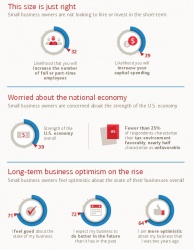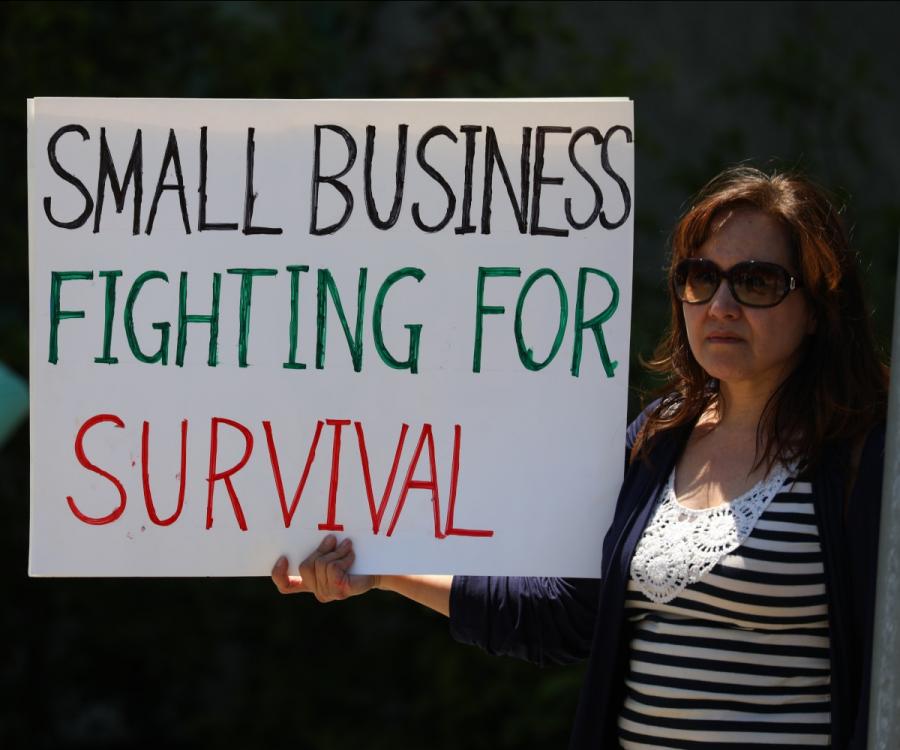Small business owners are hesitant to hire and invest in their business in the near-term, yet continue to be optimistic about the long-term future of their business, according to the inaugural Bank of America/CFI Group Small Business Forecast.
Pessimism about business conditions may explain why small business owners are hesitant to hire and/or invest in more resources. Nearly half (47 percent) believe the tax environment where they operate is “unfavorable” or “very unfavorable,” compared to 22 percent who think it’s “somewhat favorable” or “very favorable.” Nearly half (45 percent) of respondents find it “difficult” or “very difficult” to run their small business where they are today, while just 13 percent say it’s “easy” or “very easy.” Additionally, strength of the U.S. economy received an unflattering score of just 39.
“Small business owners feel less inclined to invest and make hiring decisions right now, which is likely a product of an uneven economy,” said Robb Hilson, Bank of America Small Business executive. “However, entrepreneurial spirit remains strong; small businesses continue to bet on themselves and are confident in the long-term health and success of the businesses they’ve built.”
The Bank of America/CFI Group Small Business Forecast measures the factors that drive development and the economy in the small business community at large. Results of the study, which can be found here, show small business owners’ attitudes and assess their expectations for staffing, spending, revenue, economic health and lifestyle satisfaction in the coming year. The index results are derived from a statistical model designed to identify the key predictors of small business owners’ growth expectations.
Looking toward the coming year, six out of 10 (61 percent) respondents said there is a high likelihood their revenues would grow by a significant margin, similar to findings in the spring 2014 Small Business Owner Report. However, a significant majority are not planning to increase hiring in the next 12 months, indicating that many small business owners will be working to grow their business with the staff and resources they currently have. Respondents rated likelihood to increase staff at just 32 out of 100.
Small business owners perceive overall economic threats to their business: they see health care costs, strength of the U.S. dollar and consumer spending as some of the biggest risks. When it comes to health care, 33 percent of respondents currently offer health insurance; 5 percent plan to offer it in the next two years; 14 percent would like to offer health insurance; and 35 percent have no intention to offer it.
Overall, small business owners surveyed showed an overall “life satisfaction” score of 71 out of 100. This was the highest-ranked category of all factors measured and reflected satisfaction with standard of living, stress management and personal fulfillment. The highest level of satisfaction came from those small business owners working in finance/insurance/real estate and transportation/utilities sectors; small business owners in the wholesale and retail trade industries are least satisfied.
The study also found that women entrepreneurs feel satisfied with their lives, achieving the work/life balance they desire and finding their business professionally fulfilling. These findings support earlier research in the spring 2014 Small Business Owner Report that found women are focused on growth and believe they are effective at juggling work/life balance.
“Entrepreneurs are largely quick to say they are happy with the way their businesses are going now, but are playing a bit of ‘wait and see’ before committing to major investments in their businesses,” said Rodger Park, director of Customer Analytics at CFI Group. “The small business community remains a bit wary of overall economic conditions and is likely waiting to see what effects potential political and business climate changes will have in the coming months before deciding to expand.”
In addition, small business owners feel more positive about the future than the past and believe that their business is doing better now than it was two years ago. Overall optimism scored 69 out of 100. However, survey respondents expressed somewhat lower confidence in their ability to meet their retirement goals and to achieve their preferred work/life balance, reflecting an ongoing tension between business and pleasure.
Source: Bank of America/CFI Group










